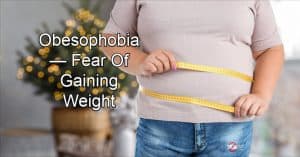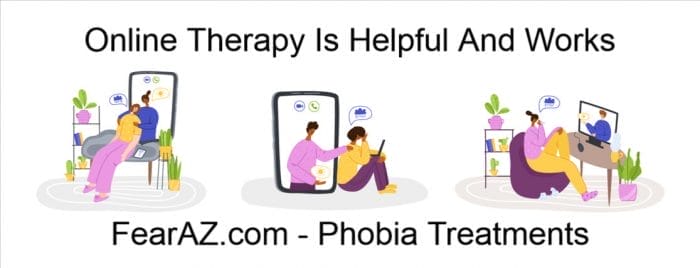Share This Article
Fear of Gaining Weight Can Lead to Other Issues
Do your thoughts and feelings regulate the way you eat? Are your eating patterns disturbed, and do you feel a morbid sense of dread with each bite?
Is every morsel laced with the fear of gaining weight?
You are not alone.
Like many around you, you might be suffering from obesophobia, the irrational fear of gaining weight.
The first step to dealing with this phobia is to be aware of it. Understand the phobia, where it stems from, and recognize the symptoms. Join a support group or talk to a trusted someone about your fear.
Practice yoga, meditation, and exercise to help manage your fear.
Finally, consult a therapist for medication and professional treatment if you are unable to tackle it yourself.
Read on for more.

What Is Obesophobia: What You Need to Know
The irrational fear of gaining weight, even in cases when you might be actually losing it, is known as obesophobia. When you suffer from obesophobia, you expose your body to harmful extremes such as starvation. This happens when you have an underlying fear and an unhealthy relationship with your body and food.
Some common concerns about gaining weight may not necessarily be linked to obesophobia. This fear only exists in those who experience anxiety, distress, and/or tension at the thought of consuming food and gaining weight.
Also known as pocrescophobia, obesophobia is a specific phobia. This means that it is a phobia with an unreasonable and unexplainable fear of things that do not actually pose a threat.
Causes of Obesophobia
Different factors and circumstances play a role in the development of obesophobia. For some, the fear is a result of genetics and a family history of food disorders, mental illness related to food, or the fear of food itself.
Other common reasons that result in obesophobia are past traumatic events. Some may start associating the fear with a negative food event they may have experienced in the past. Or if peers or family members constantly teased them about their body, they may suffer from obesophobia.
Prolonged exposure to television where different ideals of beauty are projected can be harmful and can lead to a growing fear of food. You may also end up developing obesophobia if you observe others around you going through the same issues with food and weight.
What Is Obesophobia Like?
Obesophobia can not only affect your relationship with food but also with people around you. You start living an unhealthy lifestyle, avoiding food, and depriving your body of essential nutrients.
Your social life is also affected, because you’ll tend to avoid social events and gatherings involving food. The past event that damaged your relationship with food lingers, and this affects your regular routine. You are unable to complete your daily tasks because of this interference, and you start losing concentration, focus, and motivation.
Symptoms of Obesophobia
Consider whether you may be dealing with obesophobia or another food disorder by looking for these key psychological and physical symptoms:
Psychological Symptoms
- Frequently working out to excess and eating very small portions of food.
- Irrational concern about becoming obese even amidst weight loss.
- Poor self-image.
- Low self-esteem.
- Unhealthy relationships with others.
- Obsessive-compulsive disorder.
- Always anxious about gaining weight, so avoiding events that involve food.
- Counting calories obsessively.
Physical Symptoms
- Underweight and undernourished because of a complicated relationship with food.
- Excessive sweating and heart palpitations at the sight or thought of food.
- Feeling dizzy and lightheaded.
- Shortness of breath.
- Constant chest discomfort.
- Abdominal pain.
How Do You Deal with Obesophobia?
Like any other phobia, dealing with obesophobia is no easy feat. Especially when it concerns food, something that you need for survival. The first step is to acknowledge the issue and accept it.
Try to determine whether you suffer from the fear of food or from another mental illness related to food such as bulimia or anorexia.
Try to talk to a trusted friend or relative about the problem. Sharing your problem can ease the load.
If you can’t do this by yourself or with a friend, talk to a therapist who can help you identify your issues. With professional guidance, work to identify whether you suffer from the fear of food or from another form of mental illness related to food.
Another helpful way to deal with phobia is to join a support group where you’ll find people going through similar circumstances. This will give you the opportunity to discuss your fears with people who can relate to them and also help you come to terms with specific food experiences that make you anxious.
Yoga and exercise can help you deal with the phobia and help you feel better about your physical appearance. Limit caffeine intake as it may make you feel anxious and stressed.
Obesophobia Treatment
Although there are no specific and exclusive treatments designed for obesophobia, there are plenty of available treatment options to consider to help those struggling with a troubled relationship with food.
Exposure Therapy
This treatment is based on the philosophy of exposing you to the source of your fears. During treatment, you may be gradually exposed to calorie-dense food items. The therapist does this in a controlled, safe manner so that your relationship with food improves over time.
Cognitive Behavioral Therapy
Through conversation and guidance, a professional therapist helps clients sort through those negative thought patterns that led to the growth of the phobia. This, in turn, helps clients identify habits. Additional benefits are the learning of coping techniques to deal with a fear of food.
How to Cope with Obesophobia
Coping with a phobia might not be easy, but it is effective. In the case of obesophobia, maintaining and revisiting a list of beliefs may serve as one coping mechanism. Here’s an example:
- Honor your body and accept it just as it is, with all its flaws and imperfections. The more you love your body, the more comfortable you will be with any changes it endures over time.
- Stop comparing yourself with others. The fear of gaining weight is closely linked with peer pressure and societal pressure.
- Follow a diet routine that is suitable for your body and includes all the nutritional requirements that will keep you physically and mentally fit. If you suffer from an eating disorder, make sure to reach out for help immediately.
- Identify the source of your fear. If the fear stems from people commenting about your body, then draw a boundary and express your concerns with them.
- Commit to acknowledging your fears and work towards getting rid of them, one step at a time. Read a book, listen to music, and avoid those who bring you down because of your appearance.
Final Words
Fear remains a fear only until you come to terms with it, acknowledge it, and then work your way to getting rid of it. If your fear has taken the best part of your life, there are ways to get it back. Resort to help from a professional, believe in self-love and self-help, and improve your habits and routine a little bit each day to enjoy an anxiety-free life where food is a pleasant thought not a stressful one.




